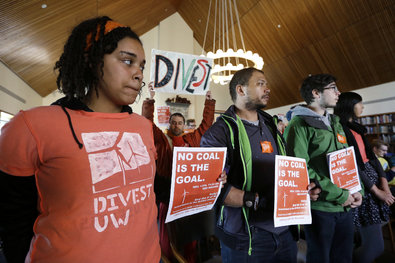
Is College Divestment from the Fossil Fuel Industry Worthwhile?
This summer, Georgetown joined Stanford in its promise to stop investing in coal companies, under pressure from student groups seeking widespread college divestment from the fossil fuel industry. But many, including environmentalists, have called these efforts useless, as divestment hardly seems to make a financial dent in the industry and it does not directly address the capping of greenhouse gas emissions. Is divestment a useful strategy for mitigating climate change, or is it effective in other ways?
* divestment = 투자 회수; 주식 매각/ fossil fuel = 화석 연료/ environmentalist = 환경 운동가/ make a dent in ~ = ~에게 인상[감명, 영향, 충격]을 주다; ~을 움푹 들어가게 하다/ capping = (지출, 요금 따위의) 상한선 책정, 규제/ greenhouse gas emission = 온실가스 배출(물)/ mitigate = 완화[경감]시키다
 (화석 연료 산업) 투자 회사는 기후 변화를 완화시키는 유용한 전략인가요 아니면 다른 방법으로 효과가 있나요?
(화석 연료 산업) 투자 회사는 기후 변화를 완화시키는 유용한 전략인가요 아니면 다른 방법으로 효과가 있나요?
1. Universities Must Divest from the Fossil Fuel Industry
Why should universities invest in an industry that has deliberately sought to undermine the knowledge that we have produced?
2. The “Moral” Crusade is Misguided
Don't exacerbate the ideological divide and political polarization that has paralyzed Washington on climate change.
3. An Empty Political Move
It is one of those campaigns that stir up people who want to feel like they are doing something, when, in truth, they are doing nothing.
4. For College Students, A Means of Dissent
University students should have the power to speak out against injustice, at least by having a say in the way their universities invest money.
Sample Essay
Pitching Divestment as a “Moral” Crusade is Misguided
Students are right to be concerned about climate change, but the focus of the divestment movement is fundamentally misguided. Students, faculty and staff can be effective by acting in ways that will make a real difference, but the symbolic action of divestment — and the fight to convince universities to do so — has opportunity costs: It diverts us from focusing on what really matters.
Divestment doesn't affect the ability of fossil fuel companies to raise capital: For each institution that divests, there are other investors that take its place. As long as the world still continues to rely on fossil fuels, and consumes them at current rates, the companies that supply them will have a ready market for their products.
What really matters for addressing climate change is enlightened public policy at the international, national and sub-national levels. In particular, it will take serious, economy-wide, carbon-pricing regimes – either carbon taxes or cap-and-trade systems – to bring about meaningful reductions in carbon dioxide emissions.
At Harvard, where I teach, the student leaders of the divestment movement themselves acknowledge that divestment would not have a financial impact on fossil fuel companies. For them, divestment is a “moral strategy.” This, to me, presents another problem.
Pitching divestment as a moral crusade will play into and exacerbate the ideological divide and political polarization that has paralyzed Washington on climate change (and other issues), diminishing even further the prospects for effective climate policy in the United States. Whatever moral statement divestment might make is not worth risking further disintegration of the climate-policy process.
The real contributions of Harvard and other great research universities to climate change policies will be through our products: our research, teaching and outreach to policy makers. That is how great universities have made a difference on other societal challenges for decades and centuries, and it is how we will make a real difference on this one.





![]() (화석 연료 산업) 투자 회사는 기후 변화를 완화시키는 유용한 전략인가요 아니면 다른 방법으로 효과가 있나요?
(화석 연료 산업) 투자 회사는 기후 변화를 완화시키는 유용한 전략인가요 아니면 다른 방법으로 효과가 있나요?






